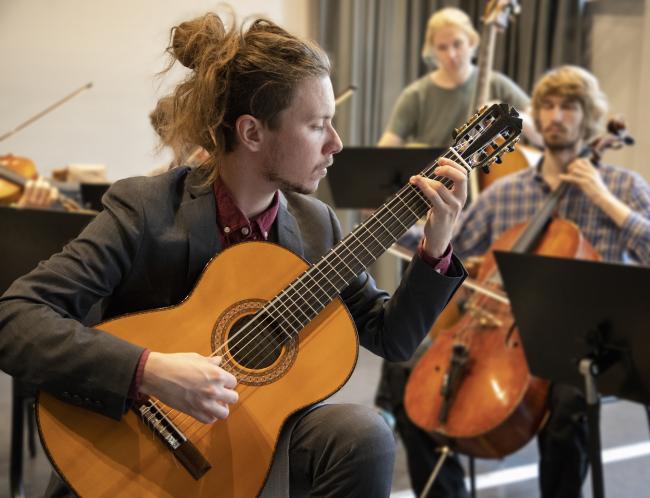Bachelor Programme in Music (180 ECTS credits)
After three years of music studies at Ingesund School of Music, located in a beautiful environment just outside Arvika, you will have a solid foundation for a life as a professional musician.

The Bachelor Programme in Music is aimed at anyone who wants to become a versatile and creative musician, active within the classical music scene. The programme provides a great deal of room for individual practice and solo play. There will also be many opportunities to play with others in everything from smaller ensembles to string orchestras, symphonic orchestras, symphonic brass orchestras, choirs and big bands. You will also have access to practice rooms and lecture halls almost around the clock. The teachers are highly educated and skilled, and they are all very passionate about their work.
MAIN INSTRUMENT
We offer education in the following main instruments:
- violin
- viola
- cello
- contrabass
- piano
- voice
- guitar
- flute
- clarinet
THE ARTISTIC PROFILE OF THE PROGRAMME
The programme’s profile is designed based on the three forms of knowledge that shall permeate Karlstad University’s artistic education in music:
- Excellent technical and artistic musical skills.
- Interaction and cooperation within and between different musical and artistic contexts.
- Creativity, innovation and entrepreneurship.
At Ingesund School of Music, you will have the opportunity to develop your technical musical skills and ability for artistic expression in order to reach a high level of skill, both as a soloist and when performing with others. The education also emphasises your reflections regarding your own artistic process. You will also, at an early stage, have the opportunity to practice performing in front of an audience.
CONTENTS AND SCOPE OF THE PROGRAMME
The programme spans over three years and awards 180 credits in total. It consists of three larger sections, each of which comprises several courses:
- Main instrument I-IV, 90 ECTS credits
- Ensemble I-V, 37.5 ECTS credits
- Music knowledge I-IV, 30 ECTS credits
The courses in each of these sections are evenly distributed throughout the programme’s six semesters. The six main instrument courses include learning and performing classical music from various eras, technical training and rehearsal techniques. The five ensemble courses are mainly focused on chamber music and performing in an orchestra. In both of these sets of courses, you will have the opportunity to perform in the school’s internal and external concerts, as well as in various concerts arranged by other actors in the music industry.
The four courses in music knowledge includes the history of music, ear training theory, music theory, the basics of sheet music software and sequencer software, and the realities and inner workings of the music industry. The programme also includes an independent degree project, as well as an optional course where you will be given the opportunity to specialise or broaden your knowledge within a field relevant for your future profession.
The programme is built around individual instrument lessons, group classes and joint classes where students perform for each other, as well as projects, artistic seminars and master classes. The examinations mostly consist of music performances, but also of individual written assignments and oral presentations and discussions in seminars.
- Overview of the bachelor programme's courses
- Overview of the music knowledge courses
- The bachelor programme’s course syllabuses (all courses are listed under the header “Course of Study”)
DEGREE OF BACHELOR OF FINE ARTS
The programme comprises 180 ECTS credits. After completion, students will be awarded a Degree of Bachelor of Fine Arts, with major in Music. In order to receive the degree, students must also have completed an independent degree project (worth 15 ECTS credits) in the main field of study.
HIGHER EDUCATION DIPLOMA IN MUSIC
If desired, students may also choose to study for only two years, and receive a Higher Education Diploma in Music, of 120 ECTS credits. In order to receive the degree, students must also have completed an independent degree project (worth 7.5 ECTS credits) in the main field of study.
ELIGIBILITY REQUIREMENTS
To be eligible to study in Sweden at university studies, you must have completed upper secondary studies and upload proof of this to Universitystudies.se. You also have to show documented level of Swedish or English (at least English level 6 according to Swedish system of studies).
Read more at:
https://www.universityadmissions.se/en/apply-to-bachelors/
Also read carefully with regards to what papers to prepare, based on your country of origin:
https://www.universityadmissions.se/en/apply-to-bachelors/provide-application-documents-bachelors/country-instructions/
For non-EU citizens tuition fee for the complete Bachelor education is 750,000 SEK (approximately €83,333).
Read more about eligibility to the Ingesund School of music on:
https://www.kau.se/en/ingesund-school-music/education/study-ingesund-school-music/anmalan-och-antagning/eligibility
ADMISSION TO THE BACHELOR PROGRAMME IN MUSIC
In order to assess that the applicants reach the entry requirements for the Bachelor Programme in Music, all applicants must demonstrate their performing abilities and technical skills with their instrument. All applicants must also demonstrate their knowledge of music theory in a written exam.
The main instrument entrance exam is divided up into two rounds. The first round is designed to assess that the applicants meet the entry requirements. Applicants must pass this test in order to proceed to the second session. In the second round of tests, additional main instrument tests are performed in order to rank the applicants in the respective instruments.
In order to be eligible, applicants must also pass the music theory exam. In general, this test will be performed at the school of music you have applied to. Within two weeks following the application deadline, applicants will receive invitations to participate in the entry examination. This invitation will be sent to the email address stated in the application.


